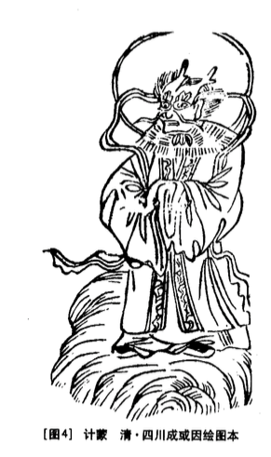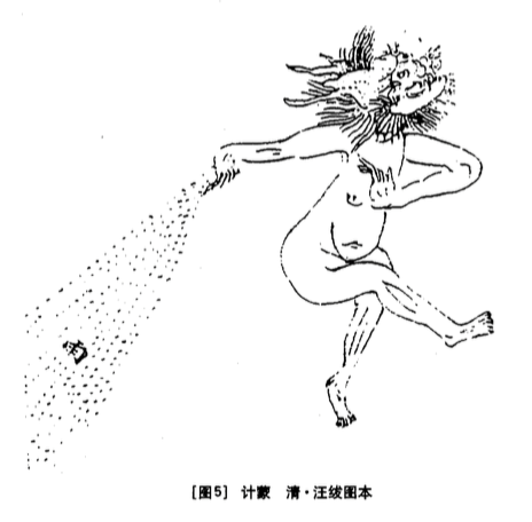水怪潛幽草, Water monsters lurk in the murky grass;
江雲擁廢居。 River clouds embrace the deserted dwelling. 雷驚空屋柱, Thunder shocks pillars in the empty house;
電照滿牀書。 Lightning shines on the couch full of books.[1] 竹瓦風頻裂, Bamboo tiles, [in the] wind, frequently crack;
茅檐雨漸疏。 [Along] the straw eaves, the rain becomes sparse. 平生滄海意, [I’d] set my mind on a life on the vast sea,
此去怯為魚。[2] [Yet I] henceforth fear to be a fish.
*From Yuan Zhen ji 元稹集 (Beijing: Zhonghua shuju, 1982), 162.
[1] During the Tang dynasty, chuang 床/牀 could refer to a couch or a bed. As the couch is more likely to be the place where one reads and piles books, I guess the chuang in this line refers to a couch. [2] Red characters rhyme.
A few days ago, I was woken up in the wee hours by the sound of raindrops wildly drumming against my window. We’d had a few showers in the previous few weeks, but not as heavy as that morning. In my part of the city, it was not a thunderstorm, but it did bring me to some poems about thunderstorms, among which I particularly enjoyed this one by the eminent mid-Tang poet Yuan Zhen 元稹 (779-831).
Yuan Zhen is often juxtaposed with Bai Juyi whom I wrote about last week, as both poets were active in the New Yuefu 樂府 (Bureau Music) Movement that introduced more social criticisms into new Yuefu titles. The poem translated above, however, is a lüshi 律詩 (regulated verse).
I personally enjoy night thunderstorms a lot (as long as I’m well-protected by a roof, of course). I like to imagine the gods and goddesses in charge of thunder, lightning, wind, and rain being busy up in the clouds. I also like to wonder when the sky will finally crumble and plan for what I’ll do then. Yuan Zhen’s depiction of the dramatic scene is very vivid. It’s not clear in the poem whether the feiju 廢居 (deserted dwelling) refers to Yuan Zhen’s house or someone else’s that he was looking at, but it would appear that he had a much more unsettling experience than I normally do while lying on my big bed in a modern concrete building. But even in such a terrifying moment, Yuan Zhen had a snapshot of his books, which reveals something about what kind of a man he was.[3]
At first sight, the last two lines seem to have a self-mocking tone. Drifting on the sea is a common metaphor for the life of (banished) literati, but it could suggest very different moods depending on the context. One might be willing to leave the hustle and bustle of human society in pursuit of tranquility; one might also be filled with disappointment because of an unsuccessful political career; one might feel both. After all, even the Master once said that he would take a raft to float about on the sea if his teaching made no headway.[4] Yuan Zhen might have shared this interest in the sea, yet the thunderstorm made him realise that such a life may not be as peaceful as imagined -- even a fish may have a hard time in such a stormy day!
Bian Xiaoxuan 卞孝萱 (1924-2009) has suggested that this poem was written in 814 when Yuan Zhen was in exile in Jiangling 江陵 (present-day Jinzhou, Hubei) on the basis that jiang 江 (river) in the second line might refer to the Yangtze River.[5] If we accept this date, this poem was not written during the happiest period of Yuan Zhen’s career, and he had probably been trying to prepare himself for spending the rest of his life as a lowly regional officer, drifting on the sea without hope of achieving anything substantial.
The last two lines also remind me of a famous idiom about a dragon fan, though it might not be a perfectly comparable case. Lord Ye 葉公[6] is said to have decorated his mansion with dragon motifs wherever possible. When a dragon heard about this, it descended to Lord Ye’s mansion to see its huge fan, looking through his window with its tail dragging in his hall. Lord Ye was so scared on sighting a real dragon that he immediately ran away. This story was first recorded in Liu Xiang’s 劉向 (77-6 BCE) Xinxu 新序 and embedded in his criticism of a lord who just pretended to respect gentlemen.[7] With this reference in mind, I wonder whether Yuan Zhen was joking about his previous underestimation of the potential difficulties of life in the sea, or whether he was also indicating that he didn’t really mean to lead such a life.
Yang Jun’s 楊軍 annotation, however, suggests a very different interpretive possibility as he glosses canghai yi 滄海意 as chengfeng polang 乘風破浪 (riding on the wind and breaking/surfing through waves), which would give line 7 a subversive tone. If one wants to take this further and read political implications into this poem, one can go as far as to regard the shuiguai 水怪 (water monsters), jiangyun 江雲 (river clouds), lei 雷 (thunder), dian 電 (lightning), etc. as metaphors for the evil men who defamed Yuan Zhen and led to his exile. The subtext of the poem would then be: Yuan Zhen was threatened by terrible evils (lines 1-4) and suffered from their attacks (line 5) which by the point he wrote the poem had come to a halt (line 6). However, the harm had been done to him. In fact, the word lie 裂 (crack) in line 5 might even hint at physical injury, as Yuan Zhen was banished to Jiangling after a conflict with eunuchs at court (810) in which his face was injured by a eunuch’s whipping. And yes, he was the one who was punished by the authorities on the grounds that he, “a young man” (aged 31), should not have been so arrogant as to impeach his superiors, even though he was officially appointed as an investigative and impeaching officer.[8] So, despite his earlier intentions to fight such evils (line 7), Yuan Zhen in his depressing exile doubted he could really fight on (line 8).
I perhaps prefer to read this poem as the poet’s whimsical self-mockery in a stormy evening, but the more I think about Yuan Zhen’s experience, the more I feel there is nothing really against the political reading. Of course, the political reading is only possible if the poem was indeed written during his sojourn in Jiangling, a hypothesis entirely based on the assumption that the “river” in line 2 refers to the Yangtze River. I guess it’s better to say we have a(nother) case here in which a historicising approach yields a very different interpretation of a poem to an innocent reading.
[3] Actually he wrote similar lines for his couch full of books in several other poems.
[4] See Lunyu 5.7. For a convenient reference: https://ctext.org/analects/gong-ye-chang/zh?en=on.
[5] See Bian Xiaoxuan, Yuan Zhen nianpu 元稹年譜 (Ji’nan: Qin Lu shushe, 1980), 238; see also Yang Jun, Yuan Zhen ji biannian jianzhu shige juan 元稹集編年箋注·詩歌卷 (Xi’an: San Qin chubanshe, 2002), 602.
[6] 葉公 alternatively reads Lord She. The character 葉 as a place name used to have a different reading (the same as the character 攝 which now reads she) to ye 葉 as “leaf”, but this practice was considered archaic as early as during the Song dynasty.
[7] See https://ctext.org/xin-xu/za-shi-wu/zh.
[8] See Yuan Zhen’s biographies in Jiu Tangshu 舊唐書 (https://ctext.org/wiki.pl?if=gb&chapter=261580) and Xin Tangshu 新唐書 (https://ctext.org/wiki.pl?if=gb&chapter=676250#p4), though these two sources differ in who whipped Yuan Zhen. See also Bian Xiaoxuan’s comment on this incident in his, Yuan Zhen nianpu, 153-154.
1. Detail of “Han Xizai yeyan tu” 韓熙載夜宴圖 (The Night Revels of Han Xizai) by Gu Hongzhong 顧閎中 (937-975); both the couch (centre) and the bed (right) may be called a chuang 床/牀
2-3. Illustrations from two Qing editions of the Shanhaijing 山海經 (Classic of Mountains and Seas), both depicting the god of rain
Copyright Declaration*:
The texts and images used on the website of Rachelle's Lab are either from the public domain (e.g. Wikipedia), databases with open data licences (e.g. Shuhua diancang ziliao jiansuo xitong 書畫典藏資料檢索系統, National Palace Museum, Taipei), online libraries that permit reasonable use (e.g. ctext.org), or original work created for this website.
Although fair use of the website for private non-profit purposes is permitted, please note that the website of Rachelle's Lab and its content (including but not limited to translations, blog posts, images, videos, etc.) are protected under international copyright law. If you want to republish, distribute, or make derivative work based on the website content, please contact me, the copyright owner, to get written permission first and make sure to link to the corresponding page when you use it.
版權聲明:
本站所使用的圖片,皆出自公有領域(如維基)、開放數據庫(如臺北故宮博物院書畫典藏資料檢索系統)、允許合理引用的在線圖書館(如中國哲學電子化計劃)及本人創作。本站允許對網站內容進行個人的、非營利性質的合理使用。但請注意,本站及其內容(包括但不限於翻譯、博文、圖像、視頻等)受國際版權法保護。如需基於博客內容進行出版、傳播、製作衍生作品等,請務必先徵求作者(本人)書面許可,并在使用時附上本站鏈接,註明出處。
*Read more about copyright and permission here.







I'm glad you enjoyed it! Yes, the character 意 suggests that the poet has the desire or intention to do something.
This is such a beautiful poem! Does the 意 in the second-to-last line imply desire/wish (of the poet)?